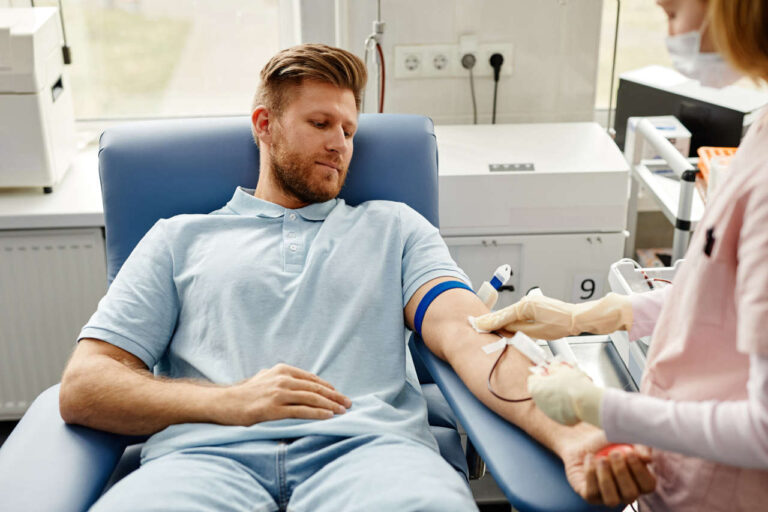
If you are battling with a medical condition that weakens the immune system, IVIG (intravenous immunoglobulin) may be recommended as a treatment to help restore your antibodies.
IVIG is a liquid human plasma product made up of healthy antibodies and given intravenously (through your vein). Although not totally understood, IVIG passes immunity naturally, the same way a mother passes immunity to a newborn baby through breast milk.
Speak to a Specialist
About Copay AssistanceWhat Diseases Are Treated With IVIG?
IVIG infusions treat various autoimmune, infectious, and idiopathic diseases. The list of diseases that IVIG therapy showed positive outcomes is continuously growing. Some conditions that necessitate IVIG treatment include:
- Immune deficiencies like immune thrombocytopenia
- Multifocal motor neuropathy (MMN)
- Chronic lymphocytic lymphoma
- Chronic inflammatory demyelinating polyneuropathy (CIDP)
- Kawasaki disease
- Immune thrombocytopenic purpura (ITP)
- Guillain-Barre syndrome (GBS)
- Lupus
- Myositis
- Neurological conditions like myasthenia gravis or multiple sclerosis (MS)
- Antiviral prophylaxis: Hepatitis A pre and post exposure, measles post exposure, and varicella in immunocompromised patients
- Other rare diseases
As a new patient to this treatment, you may have questions regarding what IVIG is and the possible side effects it may have. This quick guide discusses what to expect during your IVIG treatment and how to prepare for a comfortable infusion session.
 Risks or Common Side Effects of IVIG Infusions
Risks or Common Side Effects of IVIG Infusions
Headache or Nausea
Headache or nausea can be relieved with the following:
- Proper hydration and rest
- Antiemetic agents
- Antihistamines
- NSAIDs:
- Ibuprofen
- Motrin
- Advil
- Naproxen (Aleve)
- Glucocorticoids before and after infusion
Chills, Feeling Cold
Dress warmly with a comfortable blanket.
Fever, Flushing, or Flu-like Muscle Ache or Pain
Ask your doctor or nurse about these risks, and they may recommend a pre or post-medication. They may also recommend slowing down the infusion rate of your IVIG treatment or switching to another brand.
Rash
The majority of reported cases experienced an eczematous reaction after their first IVIG treatment, especially in patients receiving high dose IVIG.
Treatments for rashes include hydrocortisone cream, calamine lotion, and antihistamines for itching. Cold compresses may also be used. Talk to your doctor or nurse for more specific treatments.
How Does IVIG Infusion Therapy Work?
How Is It Delivered?

Now that you know what IVIG is, it’s time to learn more about its delivery. The immune globulin product is delivered through:
- A peripheral intravenous catheter or
- A central line through a vein, usually on the hand or chest.
Immune globulin may also be administered:
- Subcutaneously (SCIG), the product is injected into fatty tissue beneath the skin rather than directly into the vein.
An infusion pump is programmed to deliver the IVIG treatment at a predetermined rate to ensure the body does not experience any adverse reactions.
Pre-medications are often taken to minimize or prevent side effects, including headaches, fatigue, and allergic reactions.
How Long Do IVIG Infusions Take?
- IVIG infusion sessions may take three to five hours to deliver the entire immune globulin product.
- SCIG may take between two to three hours and can also be self-administered.
Precautions During IVIG Treatment
Your nurse will check your temperature throughout the infusion session and measure your pulse and blood pressure. This will ensure you aren’t experiencing an adverse reaction to the Ig treatment.
How Often Is IVIG Infusion Therapy Administered?
Typically, IVIG treatments will be administered every three to four weeks. Initial IVIG doses are generally administered in divided doses over several days.
Subcutaneous IG infusions (SCIG) injected into the fatty tissue under the skin require more frequent dosing (daily or two to three times per week).
How to Prepare for IVIG Treatment
You know what IVIG is, but how do you prepare for it? Since IVIG therapy can take several hours, it’s better to schedule your treatment on a day when you have no other personal or social obligations. Leading up to your scheduled treatment, you’ll want to take in as many fluids and electrolytes as possible.
Being fully hydrated before your IVIG infusion can help minimize symptoms like headaches after the treatment.
IV nurses also administer pre-medications, which can include Benadryl, Tylenol or Advil, and other medications to reduce the severity of the common side effects associated with Ig treatment.
You’ll also want to prepare for your IVIG treatment with an activity to pass the time. You can use the time to:
- Catch up on your favorite TV shows.
- Watch a movie.
- Play a video game.
- Read a book.
- Take a nap or listen to a podcast.
How Long Does It Take to Feel Better After IVIG?
It may take weeks or even months to see the effects of IVIG therapy.
Keeping Track of Your IVIG Treatment
Keeping track of your treatment and how your body reacts after each session can help your doctor identify solutions to improve the results of your treatment.
Remember to maintain open communication with your caregivers and doctors to ensure you receive the highest level of care for your IVIG infusions. You may book a call if you have additional questions about copay assistance.














